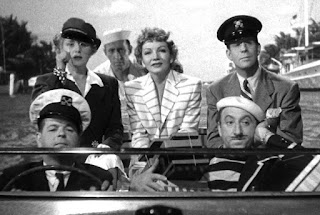Directed
by Preston Sturges; produced by Paul Jones (associate producer)
Living
beyond their means is starting to wear on the wife (Claudette Colbert) of an
inventor (Joel McCrea) in need of money to pursue his ambitions; she decides
the best thing for both of them is a divorce. She can then marry a millionaire
and satisfy her desire for the good things in life while simultaneously
securing her soon-to-be former husband the funding for his inventions.
Surprisingly, her scheme works rather easily – but not in the way anyone
expects.
Only
in a farce can such a premise be carried off successfully, and maybe only in a
Preston Sturges comedy. The movie begins unconventionally; in fact, in a manner
that may be unique in films. The opening sequence is a hectic montage of
quickly-cut scenes depicting the frantic and bizarre prologue to McCrea and
Colbert’s wedding, five years before: the groom, late for the ceremony, is changing
into his suit in a taxi, with the help of the best man; the bride rushes from
her apartment in her gown, wildly flagging down a taxi; somewhere, a bound and
gagged woman (who looks like Colbert), dressed only in her underwear, is
kicking down a door in her effort to get free; a sinister shadow falls upon a
maid, who faints – all to the accompaniment of the William Tell overture. The sequence ends with the overlaid text “…and
they lived happily ever after – or did they?”
Then
the narrative that is The Palm Beach
Story begins…
The
frenetic first few minutes bears only marginally on the plot of the picture,
and actually seems like bits salvaged from a work that wasn’t finished, and to
which The Palm Beach Story is the
sequel. Yet I suspect that it was filmed solely to provide puzzling amusement
to the audience, and was never meant to be part of anything larger. It was
probably just writer/director Sturges having fun, which he imparts to the
audience.
The
writing is first-rate, with many of the author’s trademark witticisms being
spoken as if they are unfinished sentences, which the next wise crack
completes. The comedy is interwoven with serious themes, as many of Sturges’s
movies are. The Palm Beach Story
examines the solemnity of marriage, suggesting that Colbert and McCrea,
especially the former, for all her worldly wisdom and sophistication, hasn’t a
clue as to the importance of the institution. Yet Colbert’s exposition on the
part sexual attraction plays in relationships, and in a woman’s effect on men,
is well-considered, a treatise written by the experiences of a beautiful woman’s
life. There is also a foray into the effects of riches; witness Colbert’s
reaction to being bought an immense wardrobe of clothes: the ease with which it
comes makes the acquisitions almost anti-climactic.
All
this is, as stated, mixed with comedy, some of it farce, as in the opening
montage, and in the homicidal good nature of the drunken Ale and Quail Club
(the consequences of money, alcohol and loaded firearms might be too obvious
for what Sturges really intended to say). Much of the fun is quieter, and the
viewer must be a listener, too, to catch the lines that provide the true value
of the movie.
The
acting is perfect. While McCrea is fittingly bemused and outraged by his wife’s
behaviour, and Colbert determined but sweet, applause must be given to Rudy
Vallee as the immensely rich J. D. Hackensacker (read ‘John D. Rockefeller’).
He gives sympathy and pathos to a well-written character who knows that he is
largely humourless, realises that he has too much money, and yet is a good and
decent man all the same. Some of his lines hint at the absurdity that lie in
the duality of Americans’ love of wealth and proclamations of equality: Vallee
declares that “state-rooms [private compartments on trains] are un-American”,
yet owns without qualms a yacht and a house the size of a hotel.
Mary
Astor plays Vallee’s sister, an unrepentant society-woman, married five times,
divorced thrice (“she’s been annulled twice”). Her latest name – Princess Centimillia
(“hundred thousand”) – suggesting why she wed (or perhaps why her husbands wed
her) but, as she is as rich as her brother, her real motive for marriage
appears simply the fun of it. Her relationship with Vallee is touched on enough
to show that they think each other to be silly and wrong-headed, but love each
other nonetheless.
Lesser
characters are portrayed well, and several, as much as the main characters,
display a depth of personality that is unexpected (eg. the ‘Wienie King’
(Robert Dudley), who recommends that McCrea not
eat his product: he’ll live longer).
Indeed,
depth of character and depth of story, hallmarks of Sturges’s movies, are
present here. Perhaps if they had been less prominent, the laughs would have
been harder, but such a trade-off can hardly be measured. Suffice it to write
that The Palm Beach Story is a fun,
thought-provoking comedy/farce with serious overtones. And if that description
doesn’t make a prospective viewer curious, nothing else I write will.









I have a fondness for those old screwball comedies, and this was one of the best of the lot. Mary Astor in particular is a real hoot.
ReplyDeleteMy library has this one, so I will be sure to get it.
ReplyDeleteI love old movies.
I just watched this and laughed like crazy. By the time I got to the
ReplyDeleteend, I had forgotten the beginning! The lady tied up. Then at the
end I got the reminder. Thanks.